Camping is so much fun with loved ones. Breathing in the fresh air and breathtakingly beautiful views - it's all so refreshing. Let's talk about convenience. To enjoy these times, having the right things in the right amount is pivotal. Above all, the necessary thing is the power to run the stove, charge your camera to capture the views or make a refreshing coffee.
That's when portable generators make your campsite comfortable with all the power you need. They come in different models and sizes, fitting for all needs. Knowing how much power you need, the types of generators, and how to quantify your needs and power capacity. So, to understand how to get the right generator to make camping more fun, stay with us!
Types Of Portable Generators
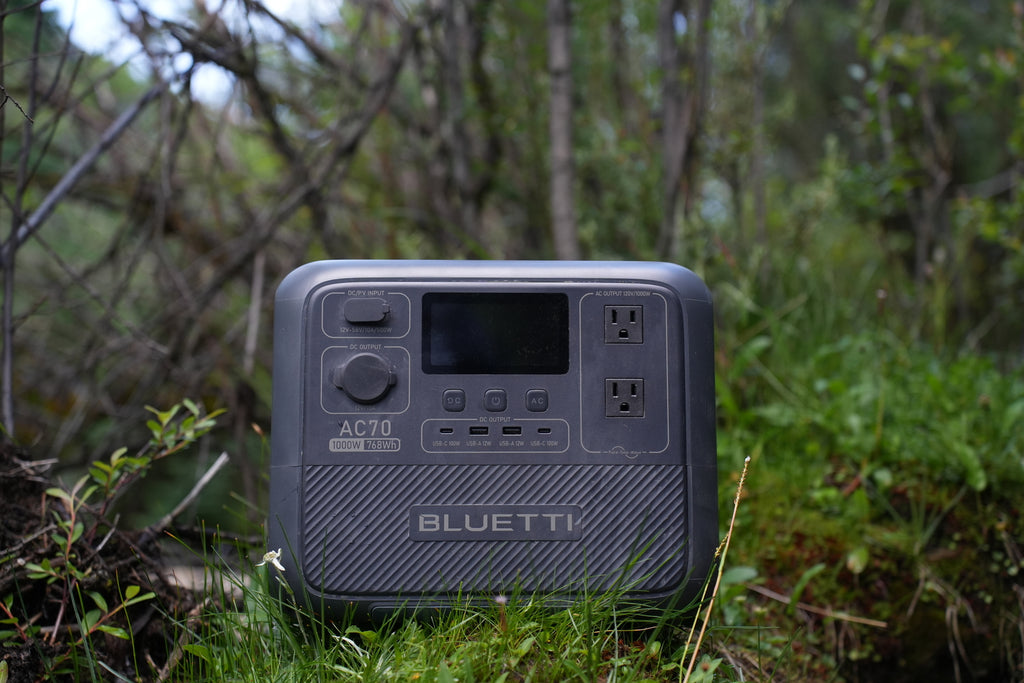
Portable Power Station
Often referred to as portable generators, portable power stations are robust, compact devices designed to provide electricity during camping trips. These generators don't run on propane or fuel like traditional ones do. Instead, they use specialized batteries to store and release energy.
The fact that these power plants are battery-operated further reduces the possibility of excessive carbon monoxide emissions. Generators powered by propane or natural gas release carbon monoxide into the air.
Portable power stations are well known for their many benefits. They frequently have lots of power outlets, as well as USB and DC connectors! These ports make power stations ideal for powering appliances and charging small devices when camping or going on outdoor excursions.
Solar Generators
Solar generators use the sun's energy to generate power. They give a green, renewable power supply for many uses. These machines are great for reducing pollution while getting off-grid power.
More and more people use them because they help you use less fossil fuels. Furthermore, they have low upkeep costs and last for many years. You can also get solar generators in various sizes and power capacities.
Gas and Diesel Generator
Gas and diesel generators are easy to use and not costly. These generators work on the mentioned fuels so power stays constant. Famous for being sturdy, efficient with fuel, and mighty in performance, they are trusted energy sources.
Yet, drawbacks exist. These machines are loud, produce toxic fumes, and add to your carbon footprint by releasing harmful gases. Also, using it for a long time can lead to significant fuel and upkeep costs. These may hurt your budget over time. Even if they work well, we must consider the effect on nature and the extra costs.
What Size Portable Generator for Camping?
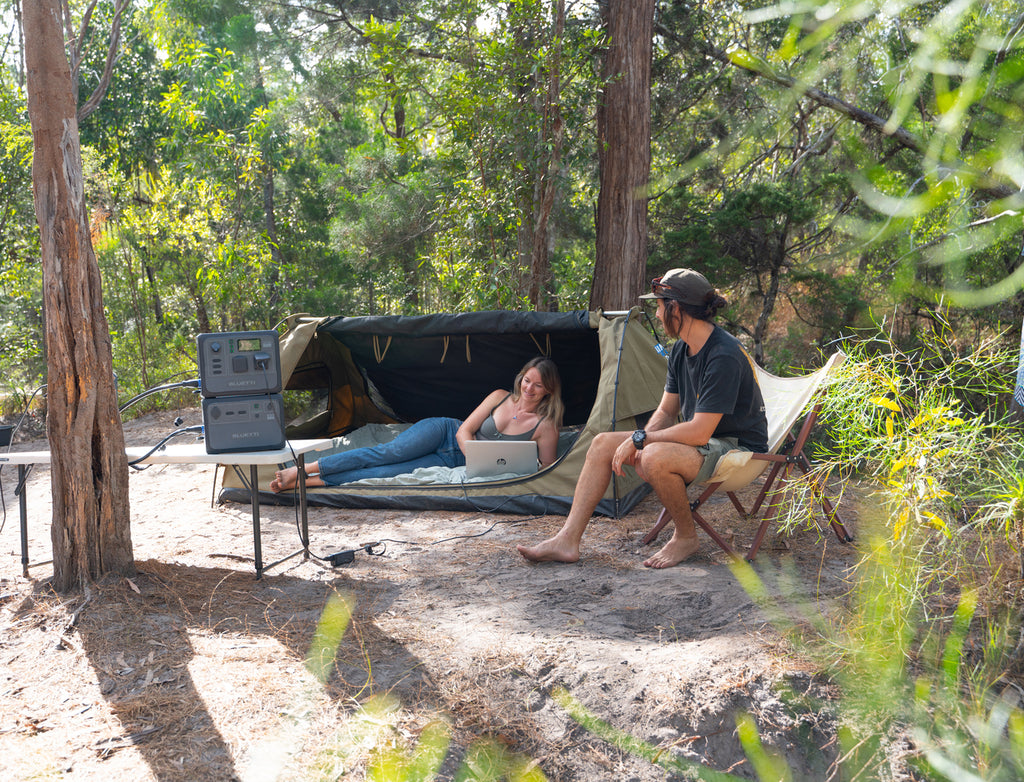
Estimate Camping Power Needs Based On Equipment
Planning your power for camping is essential to make the trip worry-free. Look at the equipment you'll need - like a small stove and stuff for charging phones or tablets. Write down all your electric stuff and how much power they need. Make a list of it - like a stove that needs 50 W, a phone charger needing 20 W, or a coffee maker using up to 100 W. Add them up - 50 + 20 + 100 = 170 watts.
Now, add a safety margin of 20%. 170W + 20% = 204W.
So, you'll want a generator of 200-250W for these devices—smaller ones only for phones, bigger for other electronic tools.
Knowing how much power you need avoids unexpected problems. Make a good plan, and your camping energy will be as smooth as your morning coffee.
Consider Starting Wattage and Running Wattage
When picking a portable generator for camping, make sure to consider the starting wattage and running wattage.
Starting wattage is the first burst of power needed to turn on devices. It's more than the continuous running power. For example, a 1000-watt microwave might need to double that at the start - around 2,000 watts.
The formula for Starting Wattage: Starting Wattage = Running Wattage × Starting Amps (usually twice the Running Wattage).
Running wattage is the steady power a device needs to work constantly. For a fridge, it could be 800 watts.
The formula for Running Wattage: Running wattage = Volts x Amps.
Figuring out both means your generator can handle devices starting up and running. Keep these formulas memorized for an excellent-sized camping portable generator.
|
Equipment |
Running Wattage |
Starting Wattage |
|
Electric Stove |
1000W |
1500W |
|
Coffee Maker |
800W |
1200W |
|
Phone Charger |
20W |
- |
|
LED Lantern |
5W |
- |
|
Portable Fridge |
80W |
120W |
|
Air Mattress Pump |
50W |
100W |
|
Electric Grill |
1500W |
2000W |
Related articles: 5 Best Small Portable Power Stations for Winter Camping
How Many Watts Generator Do I Need for Camping?
How Do I Choose a Portable Power Station for Camping?
Portable Generator Sizes for Common Camping Scenarios
Small generators
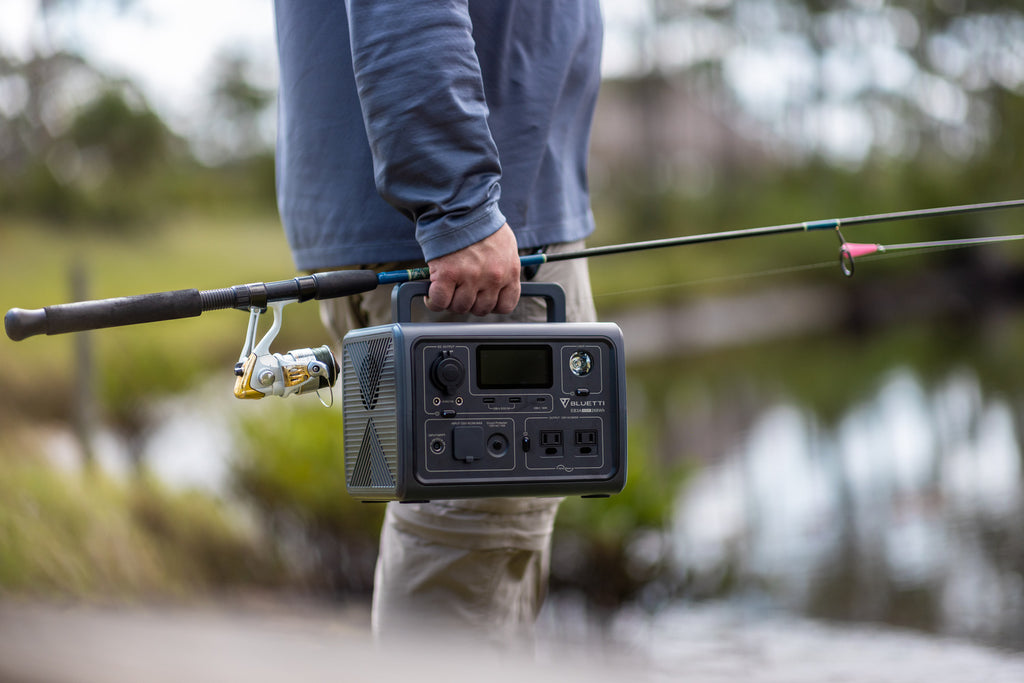
The power requirements are usually not very high for a basic camping setup. You just need enough power (500-1000 watts) to keep things working well - charging your phone, listening to small speakers, lighting up the camp with bright lights, and dealing with essential kitchen tools. Keep it simple; keep it charged. So, to fulfill such power requirements, you can opt for BLUETTI EB3A, which is featherweight and low on carbon emissions. For a small camping setup, EB3A's got your back. It comes with a 600-watt AC pure sine wave inverter (can handle up to 1200 watts when needed). The great 268Wh Power means you will stay energized for a while. The EB3A can charge phones and laptops and turn on important stuff at the campsite. It also helps handle big bursts of energy if needed so that you won't have any worries on your camping trip. Feel safer with the EB3A! Its LiFePO4 battery with BMS ensures top-level safety. Unlike standard Lithium-ion batteries, this one has more balance to work better and last longer (up to 2500 times when it's almost complete).
Moreover, the careful battery management system always watches out for your device. It keeps it safe from possible dangers—calm feelings driven by modern tech.
Medium generators
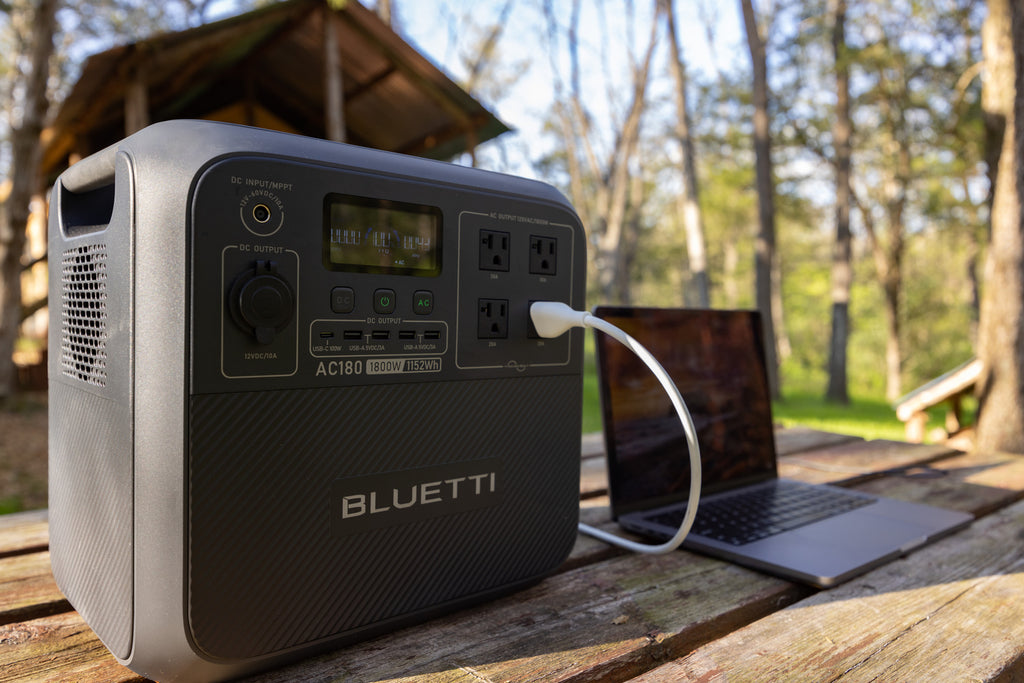
Now, if we move from a minimal to moderate camping setup(where the power requirements range from 1000 - 2000 watts), You would need a generator to handle such power requirements. Look no further than BLUETTI AC180. This little power machine only weighs 16kg. Its simple handheld design makes it easy to carry around. It means it will be fine on your upcoming journeys. The AC180 is very quiet because it uses advanced noise-canceling technology. It makes only a little sound that amounts to 45dB, which is almost noiseless. The BLUETTI AC180 has a power punch of 1,800W and can handle many requirements. And turn on Power Lifting Mode for a 2700w solid output. Different outputs - AC, USB-A, USB-C, 12V DC, and wireless charging pad - give flexibility for moving while recharging.
Large generators
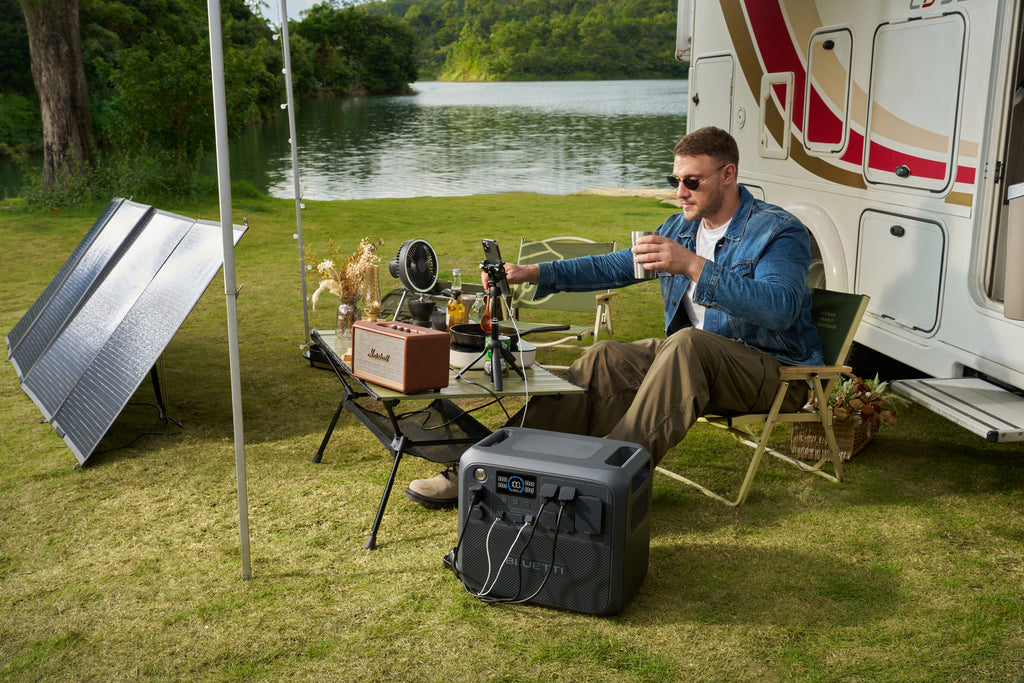
You need a portable generator with a humongous power capacity for substantial power needs(2000 W and above). For that, the top-of-the-list option is BLUETTI AC200L. It is best at charging quickly, giving power out, and operating noiselessly, all while being energy efficient. It's not just a generator; it's the next level for a quieter and better experience. AC200L packs a power punch of 2400 W, which surges up to 3600 W in powerlifting mode. Plus, it has an immense capacity of 2048Wh, which can be taken to 8192 Wh with the help of expansion batteries. The AC200L is better than earlier models because it can use much solar energy. It gets 1,200 watts from the sun when charging batteries. Make sure your devices charge fast by using energy from the sun smartly. Use and enjoy the benefits of solar energy.
Tips for Choosing Portable Generators for Camping
Fuel Efficiency And Runtime
Picking a generator that uses fuel well and has a good run time is crucial when camping. It ensures you always have power without refueling often, making it more accessible during outdoor trips.
Portability and Ease of Use
Keeping a small and easy-to-use generator makes it simple to take it everywhere. It takes your load off and makes camp less complicated so you can enjoy outdoor life more.
Noise Considerations
Choosing a quiet generator is essential, especially for peaceful camping trips. When you buy a generator, think about how much noise it makes. Decibels (dB) are used to measure this. Portable generators make a sound level of 60-85 dB, but you should go for a quieter one. Opt for:
50–55 dB: Quiet, great for campsites.
56–60 dB: A little loud, pretty good outdoors, but not perfect for sleeping spots.
61–70 dB: Disturbing outdoors.
71+ dB: Too loud, not suitable for camping spots. Ensure the noise level is low by looking at decibel ratings for a quiet camping trip.
Budget and Cost Factors
Thinking about your budget when looking at the features helps you make an intelligent choice. Finding the right balance between cost and what you need lets you choose a cheap option. This way, your power needs can be met without spending money on things that aren't required.
Brand and Warranty
Picking a trusted brand like BLUETTI ensures the generator will work well and not disappoint you. Looking at warranties keeps your money safe. They ensure you get help if problems arise, making camping less stressful.
Final Thoughts
When selecting the best portable generator, consider your camping style, essential gadgets, and power requirements. Check the capacity, the kind of fuel it uses, and alternatives such as BLUETTI's. These large devices, designed for different purposes, easily attach to your camping gear. Remember that a generator is your outside energy assistance, not just any machine. Select the best and allow consistent energy to flow through your campsite.







































































